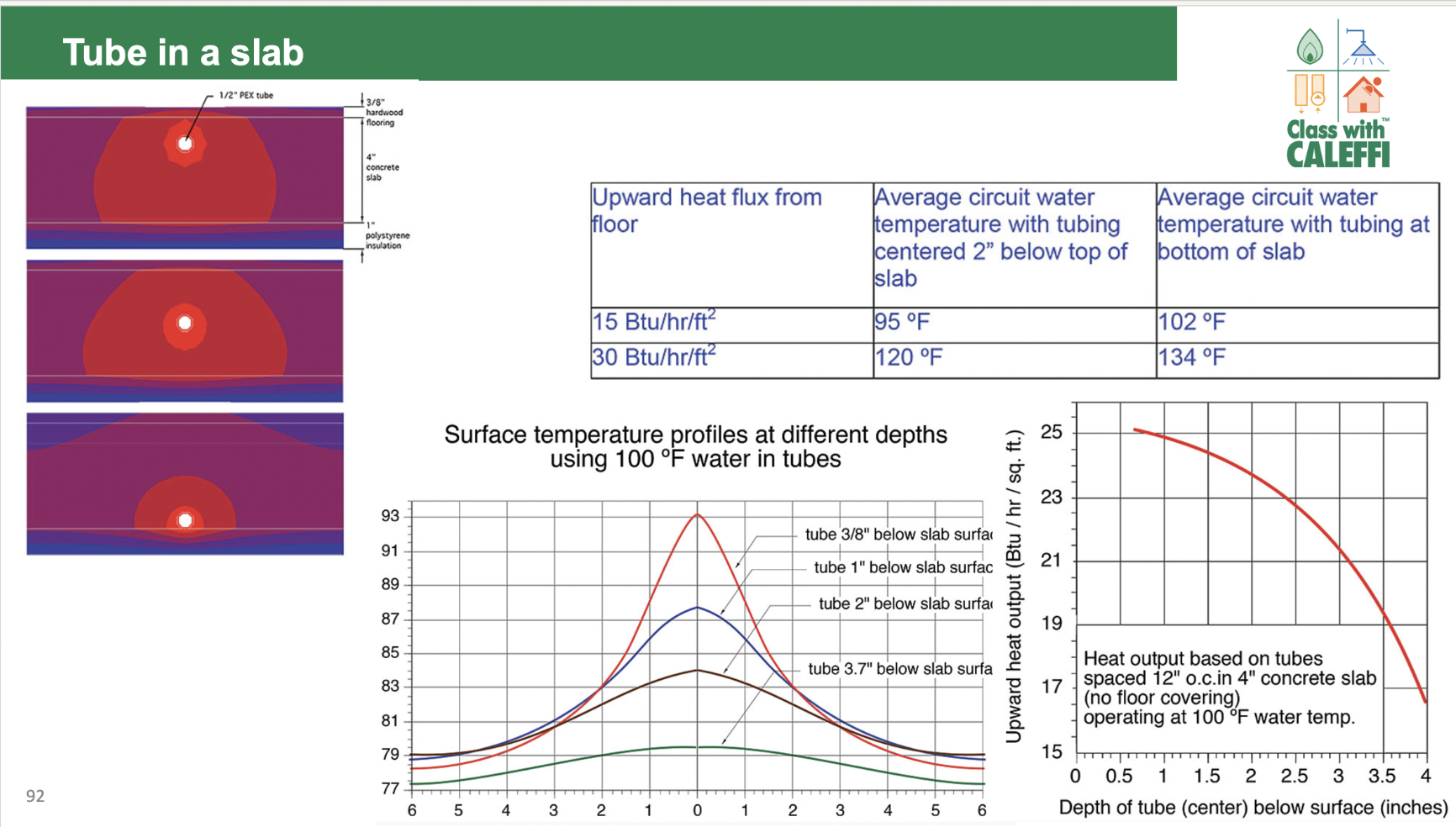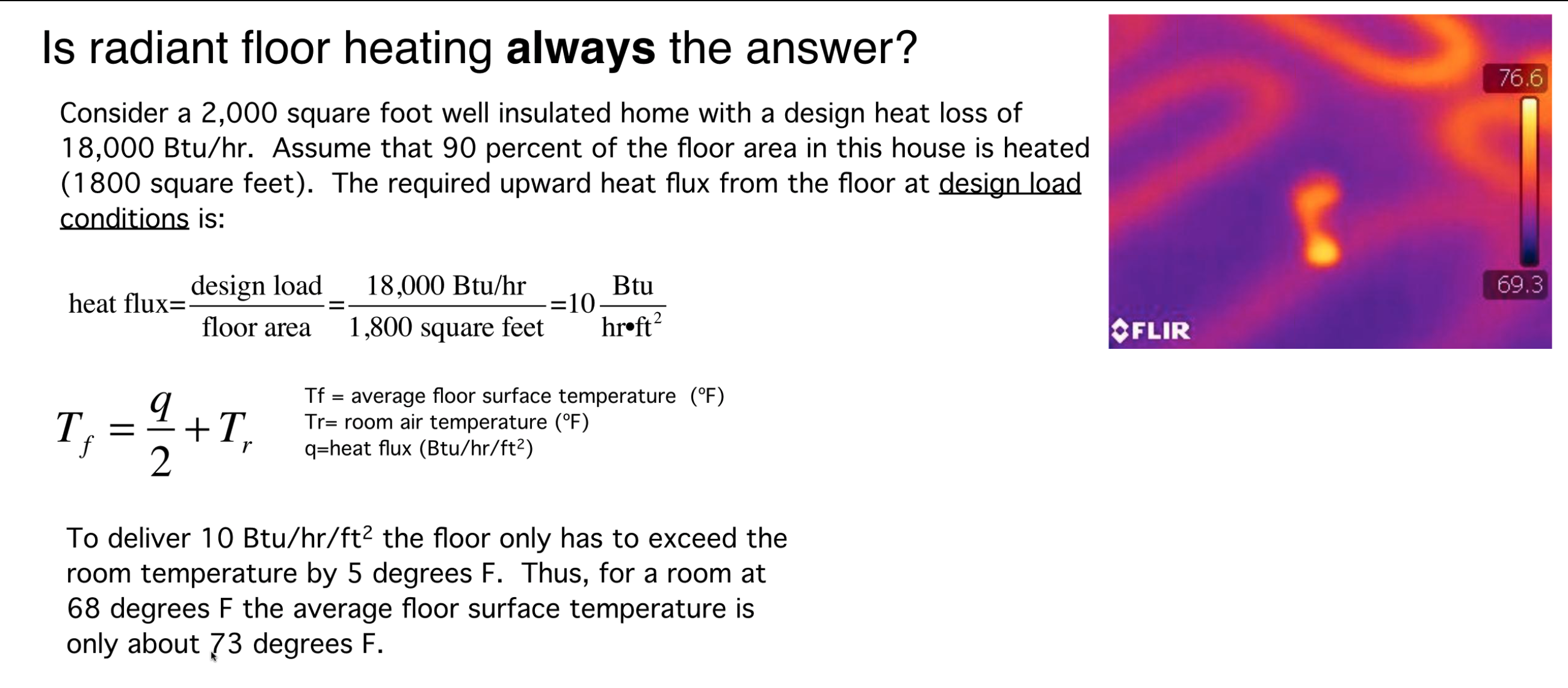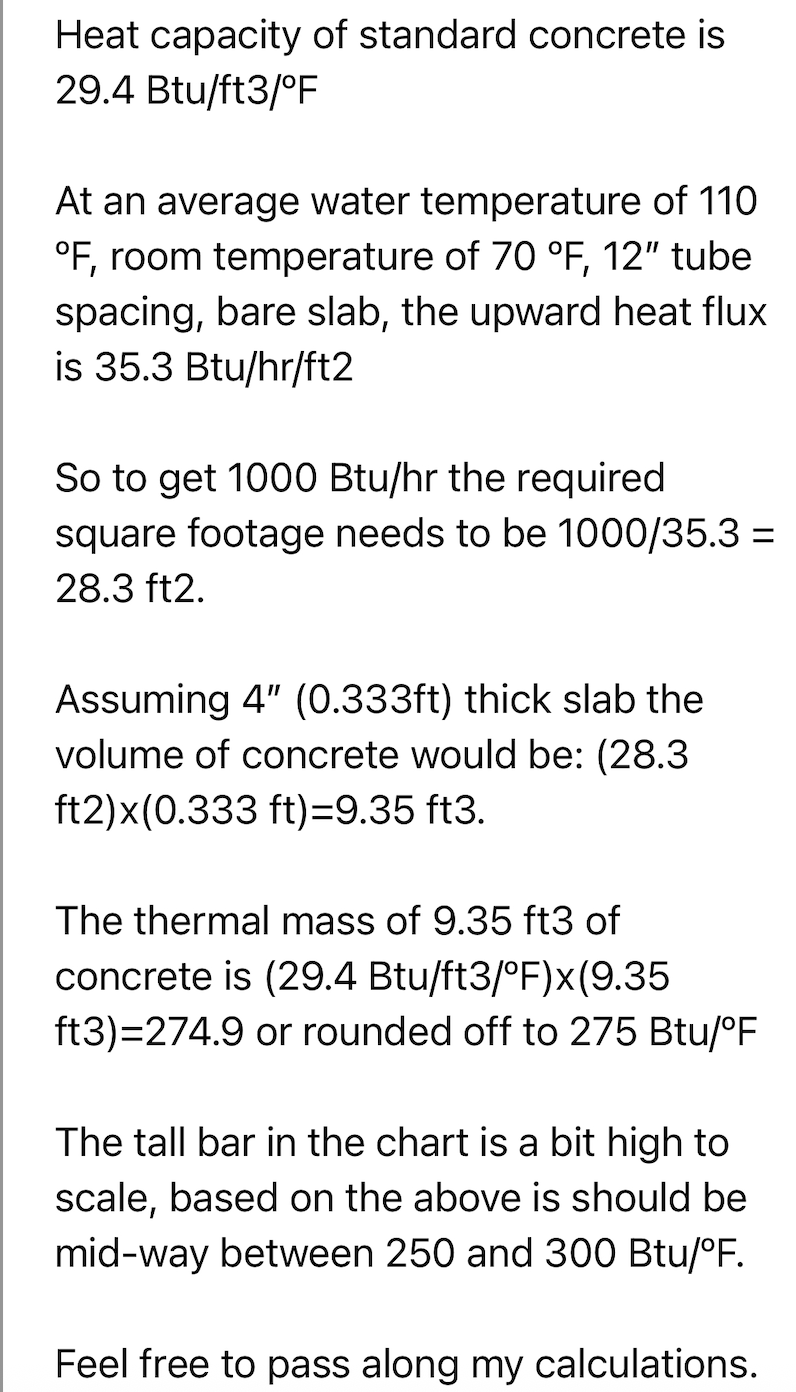Need help with new install of radiant with Buderus cast iron boiler
Comments
-
Thanks @hot_rod . I might quibble a bit with the specific numbers but I agree completely with the thrust of it.
[edited to fix math errors]
Concrete is typically 35 BTU/F per cubic foot, so 290 BTU/F is 8.4 cubic feet. At 4" thickness that's 25 square feet. To get 1000 BTU/hr out of 25 SF you need 40 BTU/SF, or a floor temperature 20F above room temperature, or a floor around 92F. I'd argue that's probably too hot.
I would offer instead that a more reasonable scenario is a floor 10F above room temperature producing 20 BTU/sf. That would require 50 square feet of floor for 1000 BTU/hr, or 16.7 cubic feet of concrete. That has a heat capacity of 576 BTU/F — it's even worse than you thought!
To get that slab from room temperature to operating temperature it has to rise by 10F, which takes 5760 BTU. That's the equivalent of 5.76 hours of operation. That's a rough estimate; when the slab is cold heat will flow into it more readily, but as it warms up it starts losing heat to the room.
In any case, it's clear that a simple on/off thermostat is going to have way too long of a lag time to be effective.
0 -
I just realized it's going to take the same 5.8 hours to warm the slab regardless of the final temperature.
0 -
Self service carwashes in the north with thick heated floors start heating their floors on October 1st and continue to heat them until May 1st because they need the thermal mass to melt ice build up on the approach aprons and in the wash bays.
My fathers car wash was built without the insulating panels that hold the pex as this was not done in 1980 as the black polyethylene pipe was simply tie wrapped to the reinforcing mesh used for the concrete before the slab was poured.
The gas boiler used 100 percent automotive antifreeze to keep the slab warm during the heating season and used a simple honeywell triple aquastat like mine to heat the antifreeze to the high limit as needed based on the boilers antifreeze temperature .
If the slab has not been poured yet a thicker 8,000 pound sand mix cement would be an asset as far as heating is concerned as it will carry more heat energy and release it at a slower rate.
0 -
"Self service carwashes in the north with thick heated floors start heating their floors on October 1st and continue to heat them until May 1st because they need the thermal mass to melt ice build up on the approach aprons and in the wash bays."
This is a very different application from residential heating, where most people want the temperature kept within a five degree window at most.
"If the slab has not been poured yet a thicker 8,000 pound sand mix cement would be an asset as far as heating is concerned as it will carry more heat energy and release it at a slower rate."
I'd hope that the preceding conversation shows that you want your emitters to have as little heat capacity as possible to be as responsive as possible.
0 -
Two things start working against you with the thick slabs or even tube at the bottom of a 4" pour. You need higher swt to get the same output and the downward loss goes up.
Bob "hot rod" Rohr
trainer for Caleffi NA
Living the hydronic dream0 -
All the more reason for overhead steam or overhead gravity hot water heating with cast iron or steel radiators in a residence.
Hopefully opening and closing of the overhead doors has figured into his heat loss.
If worse comes to worse he could install a Zurn water to forced air heater in the barn portion.
If they have not covered the floor yet they could add more tubing by pulling the existing tubing and moving the runs closer together.
My only experience with in floor heating was my fathers third home which was a factory built mess where they installed in floor heat under hardwood floors but they did not use reflector panels which only compounded the problem as reflective styrofoam sheets had to be nailed up to hold the heat in for the first floor and a pellet stoker boiler was installed to provide enough heat.
0 -
I think there is a time and place for all the different type of heat emitters. If you work on a concrete slab all day, the warm concrete sure is nice when it is cold outside.
The concern now with energy efficient homes is you may not, will not, experience the warm floor feeling.
Buildings with loads below 15 btu/ sq ft???
Might be time to consider panel rads or other "warm surface" emitters.
Bob "hot rod" Rohr
trainer for Caleffi NA
Living the hydronic dream0 -
I guess it depends on what numbers you input @DCContrarian to the formulas. In the example 29.4 btu/ cubic foot/ °F was used. It varies based on moisture/ density.
26- 32 is what an Al search turned up for heat capacity of concrete.
The author of that slide passed along his calcs.
Bob "hot rod" Rohr
trainer for Caleffi NA
Living the hydronic dream0 -
"The concern now with energy efficient homes is you may not, will not, experience the warm floor feeling.
Buildings with loads below 15 btu/ sq ft???
Might be time to consider panel rads or other "warm surface" emitters."
I agree with this completely. In a house built to modern standards you're better off just using heated floors for spot comfort in rooms you're likely to be barefoot in, like bathrooms. If you don't rely on them for space heating then the control becomes much simpler.
0 -
wow that boiler is an oldie goodie. The R2107 control wooda been the jam.
4-way mix like Hot Rod says0 -
anyone have the link for the Tekmar essay. I couldn’t find it anywhere!
0 -
Try googling Tekmar essay 021.
Bob Boan
You can choose to do what you want, but you cannot choose the consequences.0 -
Bob "hot rod" Rohr
trainer for Caleffi NA
Living the hydronic dream0
Categories
- All Categories
- 87.5K THE MAIN WALL
- 3.3K A-C, Heat Pumps & Refrigeration
- 61 Biomass
- 430 Carbon Monoxide Awareness
- 122 Chimneys & Flues
- 2.1K Domestic Hot Water
- 5.9K Gas Heating
- 116 Geothermal
- 169 Indoor-Air Quality
- 3.8K Oil Heating
- 78 Pipe Deterioration
- 1K Plumbing
- 6.6K Radiant Heating
- 395 Solar
- 15.9K Strictly Steam
- 3.5K Thermostats and Controls
- 57 Water Quality
- 51 Industry Classes
- 51 Job Opportunities
- 18 Recall Announcements






